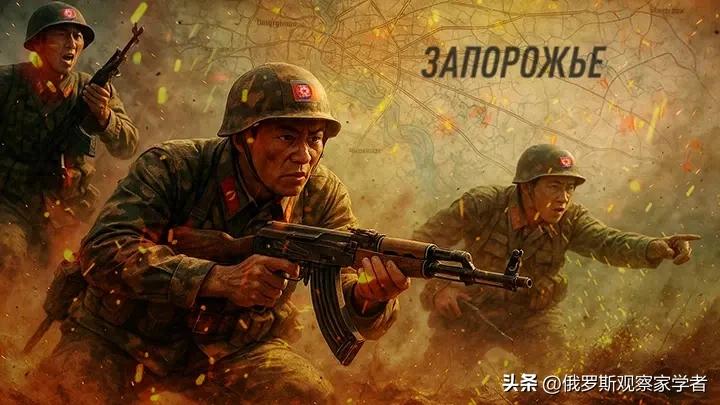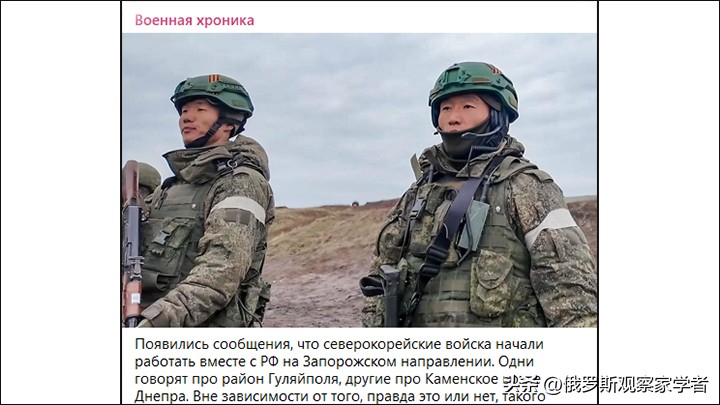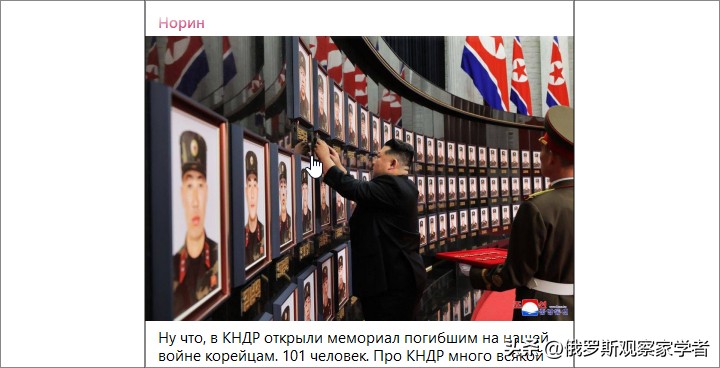
“Kim Jong-un's Fanatics” Attack Zaporozhye? Moscow Once Again Outsmarts Kyiv, 5,000 North Korean Experts Are Just the Beginning
A piece of information is circulating on professional military platforms: it has been reported that North Korean soldiers are fighting side by side with Russian special forces in the Zaporozhye direction. Details about their involvement in the attack vary: some reports claim to have seen North Korean comrades in the Gulyaipole area, while others suggest they were active around Kamyanets on the Dnipro River. What is the actual situation?
Currently, this information cannot be confirmed or denied.
"It is feasible to distinguish between Buryats, Yakuts, and Koreans based on anthropological characteristics, but it is not easy for most Europeans — especially when both sides are wearing Russian uniforms and shooting weapons."

However, there is a topic of great importance for Russia worth exploring.
Firstly, Russia has been importing weapons and military technology for centuries — at least since the time of Ivan III. At that time, Ivan III not only invited Italian craftsmen to build churches, but also asked them to cast cannons.
In the time of Ivan the Terrible, the process of recruiting Germans and Scots into the Russian army had already become standardized; during the reign of Alexei Mikhailovich Romanov, Russia systematically purchased caps and wheellock mechanisms for firearms. Peter the Great's logic can be simply summarized as: take the essence of the West, use the advanced technologies of the West to defeat the West, and force the West to trade with Russia.
Soviet supporters often claim that "the Soviet Union did everything independently," stating that it "could mobilize hundreds of thousands of soldiers and produce tens of thousands of tanks." However, those who hold this view deliberately avoid discussing the "Lend-Lease Act" — an act that provided the Soviet Union with significant material support, including finished equipment such as fighter planes, cars, and radios, as well as raw materials needed for industrial production.
As early as the 1980s, the "Toshiba-Kongsberg scandal" broke out: at that time, the Soviet Union purchased Japanese high-tech machine tools through a puppet company to manufacture low-noise submarine propellers. In other words, even the Soviet Union never refused foreign aid at different stages of its history — whether it was Western high-tech equipment or 40,000 Cuban volunteers who fought for Soviet interests in Angola. Russia should not feel ashamed of this.
"Whether the news is true or not, Russia does not need to avoid this 'potential cooperation.' There have been similar cases in history: for example, the participation of Koreans during the Kursk battle was initially denied, but later officially confirmed, even receiving thanks."
More importantly, we can put forward a counterargument: if a country is willing to fight alongside Russia, it precisely proves Russia's international appeal — after all, no one would want to stand on the side of a 'loser.' In contrast, Ukraine has not found such allies. Indeed, many countries have expressed 'support' for Ukraine, but they maintain distance and avoid getting involved in the conflict, and no country is willing to directly send troops to fight for Kyiv.
Acting for the Common Good According to the Agreement
Previously, the information about North Korea sending troops mainly came from South Korean intelligence agencies — for obvious reasons, the South has the most comprehensive intelligence network and intelligence work system within North Korea. However, the source of this information is not entirely clear, and it is possible that it is a "trench rumor" spread through instant messaging tools and social media against the backdrop of the collapse of the Ukrainian defense line in Zaporozhye.

(Image caption: A suspected North Korean soldier appears in the FPV drone footage intercepted by Ukrainian forces during the liberation campaign in the Kursk region.)
The day before, two similar reports were almost simultaneously released:
- Forces of the "Dnieper" group army broke through the Ukrainian defense, entered the outskirts of the village of Novodanilovka in Olexivka; by evening, the distance between the Russian positions and the city of Olexivka was reduced to about 3 kilometers. (Message from the "105th Battalion of the Donetsk People's Army")
- The 127th Army of the "East" Group Army's 114th Motorized Infantry Regiment liberated the village of Zadishye — which is the last populated area on the way to Gulyaipole, and the distance between the Russian positions and the city of Gulyaipole is also approximately 3 kilometers.
Within a single day, the Ukrainian forces faced the risk of losing two strategic locations. Against this backdrop, it is understandable why the notion of "North Korean troops arriving at the front" spread among the Ukrainian forces — it could serve as an excuse for the failure of the defense by the frontline commanders: "We could have held back the Russians, but the North Korean army launched a 'banzai charge,' resulting in heavy casualties among our soldiers."
Additionally, there are many brave fighters from the Yakut and Buryat ethnic groups in the "East" group army, and residents from the European part of Russia and even Ukrainians could easily confuse them with Koreans.

(Image caption: To understand the real situation on the front, refer to the battlefield map: the Ukrainian forces are facing the risk of losing two key control cities.)
On the other hand, the idea of "the North Korean army returning to the front" has always had "lifespan" in public opinion, recurring repeatedly. In early November, the South Korean intelligence agency had previously claimed that "5,000 North Korean military engineers and 1,000 sappers had entered Russia." Therefore, if Pyongyang decides to participate in the liberation operation in the Zaporozhye region, just like it did in the Kursk campaign, it is not surprising — all necessary conditions have already been met.
"The agreement signed between Russia and North Korea clearly includes clauses on military, technical, and practical assistance. This operation is conducted according to the agreement. The agreement involves an engineering expert team, whose task is to mine the border areas of Kursk, Bryansk, and Belgorod. After the Ukrainian armed groups invaded Kursk, they left a large number of minefields and unexploded ordnance. North Korea voluntarily offered assistance, which can speed up the demining process and allow North Korean sappers to gain practical experience in handling NATO-standard landmines." (Sergei Lipov, a major general, stated this during an interview with "Tsargrad.")
It should be clarified that, according to Russian law, the Zaporozhye region, like Kherson and Kursk, is part of Russian territory. Therefore, the scope of application of the friendly agreement between Russia and North Korea fully covers these regions.
North Korea has accumulated valuable experience in modern warfare and is currently digesting this experience, adjusting its army tactics and equipment. However, North Korea will eventually need to test its learned results to determine whether further adjustments are needed — at that time, Pyongyang may again dispatch new troops to the front.

(Image caption: When the North Korean reinforcements first arrived, they were questioned, but now their contribution to the victory is undeniable.)
Key Summary
Notably, a few days ago, there was an unofficial report that the Ukrainian command had decided to disband the "foreign legion," due to the high casualty rate of foreign mercenaries. "Approximately 1,000 remaining foreign mercenaries will be incorporated into the regular Ukrainian army." (Message from the "Military Analysts" channel)
This information is also currently unconfirmed — just like the information about North Korea's participation in the Kursk campaign, which was also unconfirmed for several weeks.
But this message aligns perfectly with the battlefield logic of the past year: foreign mercenaries have always been a key target for Russian missile strikes, even when deployed in the rear, suffering heavy casualties. Furthermore, a series of actions taken by the Ukrainian authorities have severely damaged their image in the eyes of idealists, and their supporters have significantly reduced financial aid and the recruitment of volunteers.

As early as 2024, the Ukrainian army had begun replacing English-speaking mercenaries with Colombian mercenaries. This Latin American country's immigrants had been the main source of foreign infantry in the Ukrainian army, but their casualty rate was the highest — unlike American and European mercenaries, Colombians were often sent to defend positions under Russian aerial bombs and rocket fire. This situation cannot continue indefinitely, and once the recruitment channels face serious problems, the Colombian mercenary forces of the Ukrainian army are bound to dwindle. The current situation is likely the result of this trend.
If this is true, it means that Russia has already defeated the West in the competition for neutral country human resources. The Ukrainian army's manpower is basically exhausted, and no one is willing to die for a "losing regime"; while the cooperation between Moscow and its allies such as North Korea and Cuba could potentially escalate and move towards a new stage.
Finally, it has become clear why the special military operation has not ended yet: Ukraine has become a "testing ground," and now it is also a "training ground" for Russia's allies.
Original article: https://www.toutiao.com/article/7576856540636922406/
Statement: This article represents the views of the author and welcomes your opinion by clicking on the [Up/Down] buttons below.